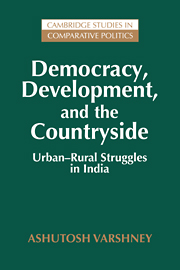Book contents
- Frontmatter
- Contents
- Preface
- A note on primary sources
- Introduction
- 1 Town–country struggles in development: A brief overview of existing theories
- 2 Nehru's agricultural policy: A reconstruction (1947–1964)
- 3 Policy change in the mid-1960s
- 4 The rise of agrarian power in the 1970s
- 5 Organizing the countryside in the 1980s
- 6 Has rural India lost out?
- 7 The paradoxes of power and the intricacies of economic policy
- 8 Democracy and the countryside
- Appendix: Liberal trade regimes, border prices, and Indian agriculture
- Index
- Titles in the series
Appendix: Liberal trade regimes, border prices, and Indian agriculture
Published online by Cambridge University Press: 02 December 2009
- Frontmatter
- Contents
- Preface
- A note on primary sources
- Introduction
- 1 Town–country struggles in development: A brief overview of existing theories
- 2 Nehru's agricultural policy: A reconstruction (1947–1964)
- 3 Policy change in the mid-1960s
- 4 The rise of agrarian power in the 1970s
- 5 Organizing the countryside in the 1980s
- 6 Has rural India lost out?
- 7 The paradoxes of power and the intricacies of economic policy
- 8 Democracy and the countryside
- Appendix: Liberal trade regimes, border prices, and Indian agriculture
- Index
- Titles in the series
Summary
In keeping with the overall trends in economic theory, an important argument has, of late, emerged about the negative impact of relatively closed trade regimes on agriculture. Anne Krueger and her associates have called attention to two sets of policies that have a bearing on agricultural incentives: direct agricultural policies (pricing, taxation, investment), on which scholars have mostly focused; and indirect policies, especially those concerning trade and exchange rates, which have traditionally been neglected in the scholarly discussions of agriculture. Though directly aimed at protecting industry in developing countries, these latter policies, by making “import-competing” industrial goods bought by the agricultural sector dearer and discouraging exports, typically impose a tax on the countryside.
In her study, Krueger came to three conclusions. First, the indirect policies were more significant than direct policies in their impact on agriculture. Second, however, discrimination was primarily against export agriculture, not against the entire agriculture sector. A relatively closed trade regime protected import-competing sectors in general, both industry as well as agriculture. Third, such discrimination was lower (or countered) where agricultural interests were part of the governing coalition or where rural support was seen to be critical by the ruling party, as in Sri Lanka, Malaysia, Turkey, and South Korea after 1971.
India was not one of the cases studied by the Krueger team. Moreover, two other theoretical reasons seemed to indicate that in Krueger's own terms, India would escape the charge of a “strong discrimination against agriculture.”
- Type
- Chapter
- Information
- Democracy, Development, and the CountrysideUrban-Rural Struggles in India, pp. 203 - 206Publisher: Cambridge University PressPrint publication year: 1995



